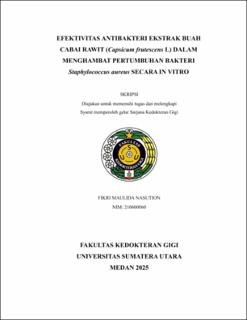| dc.description.abstract | Staphylococcus aureus is a gram-positive bacterium that can cause infections in the oral cavity, leading to pain, discomfort, and health issues. Infections caused by this bacterium are often difficult to treat due to increasing resistance to antibiotics. Cayenne pepper (Capsicum frutescens L.) is one of the plants with potential for development as a medicinal plant because it contains capsaicin, an antimicrobial compound. Additionally, various secondary metabolite compounds such as alkaloids, saponins, flavonoids, triterpenoids, and steroids possess antibacterial properties and play a role in inhibiting bacterial growth. This study aims to evaluate the potential of cayenne pepper as a natural antibacterial agent that can inhibit the growth of bacteria causing infections in the oral cavity, particularly Staphylococcus aureus. The type of research used in this study is laboratory experimental with a post-test only control design. The research samples consist of various concentrations of cayenne pepper extract (3.125%; 6.25%; 12.5%; 25%; 50%), Chlorhexidine gluconate 0.2% as a positive control, and Dimethyl sulfoxide (DMSO) as a negative control using the diffusion method (Kirby-Bauer disc). Based on the results of the Kruskal Wallis and Mann-Whitney tests, there is a significant difference among the treatment groups (p<0.05). The findings conclude that the extract from cayenne pepper is effective in inhibiting the growth of Staphylococcus aureus with inhibition zone diameters at concentrations of 3.125% (8.33mm); 6.25% (10.89mm); 12.5% (12.79mm); 25% (15.26mm); and 50% (17.04mm). | en_US |


